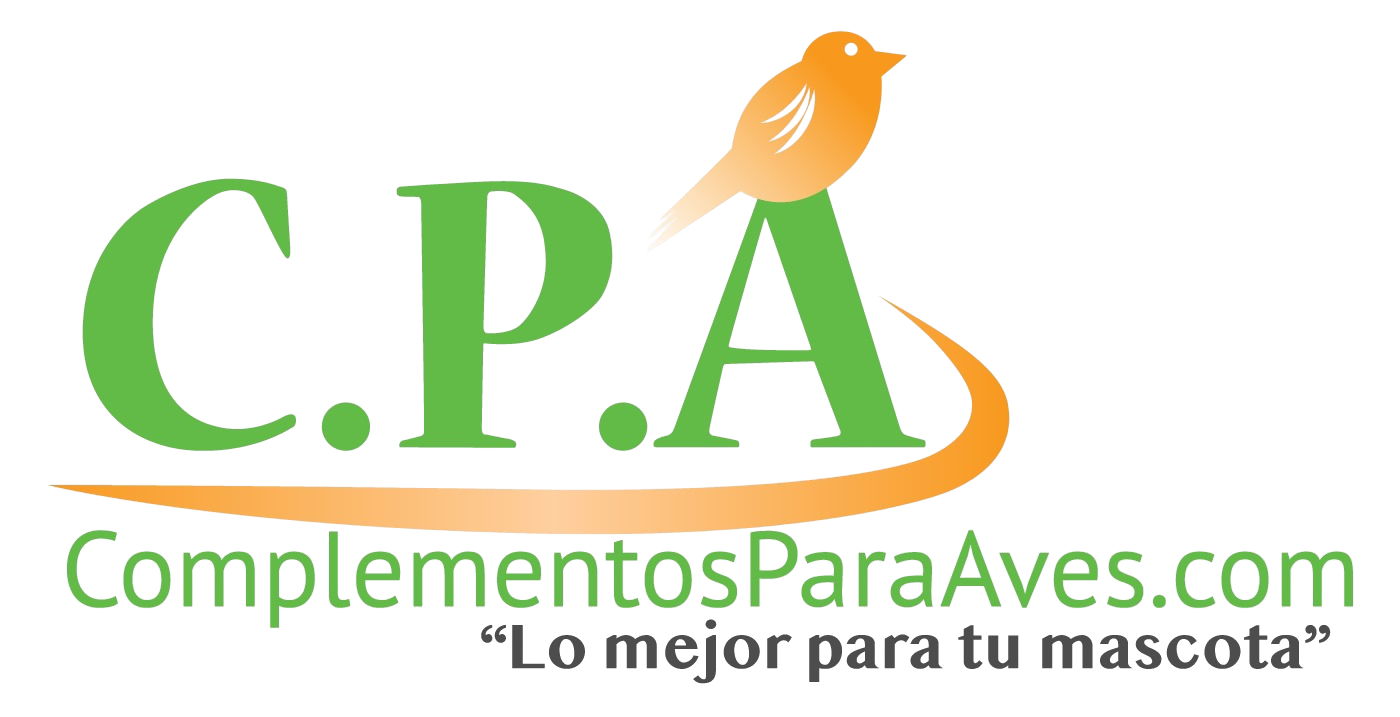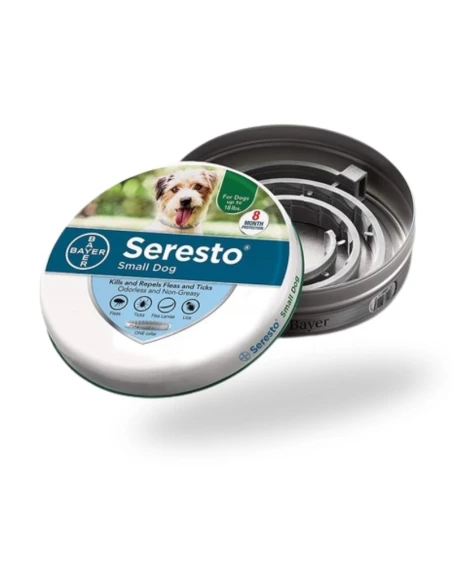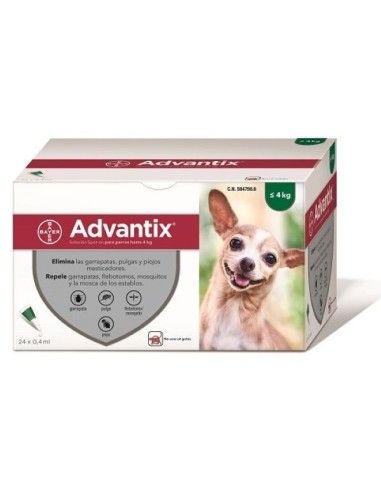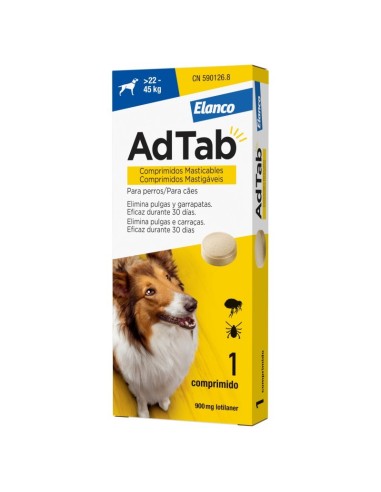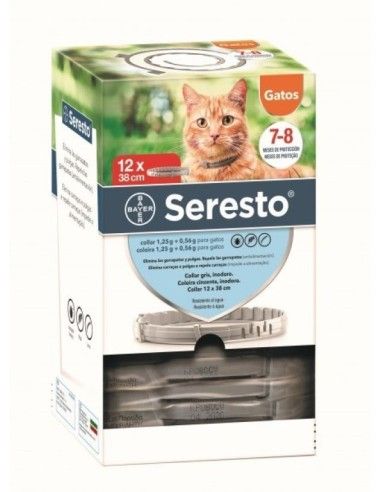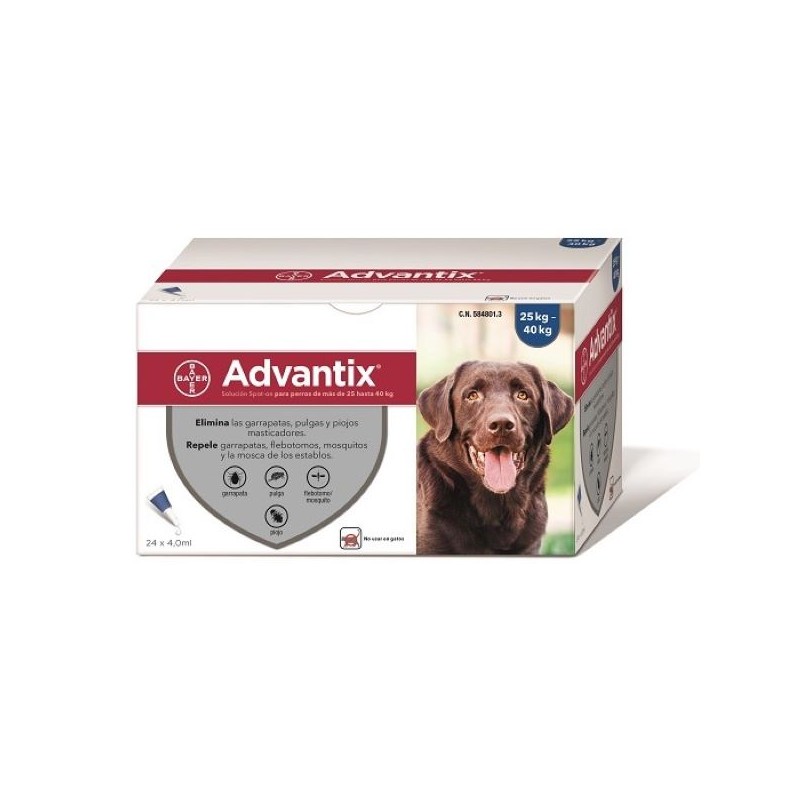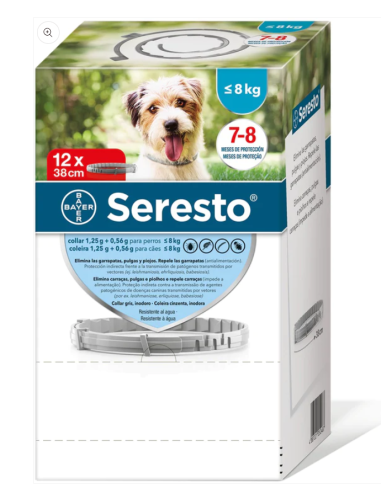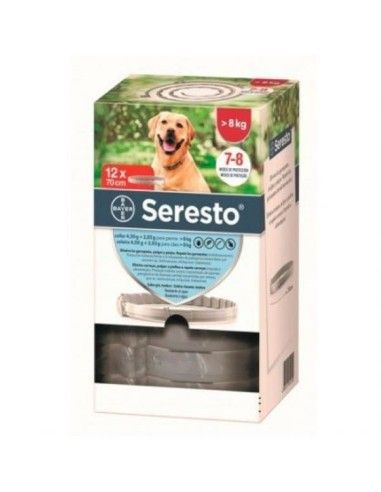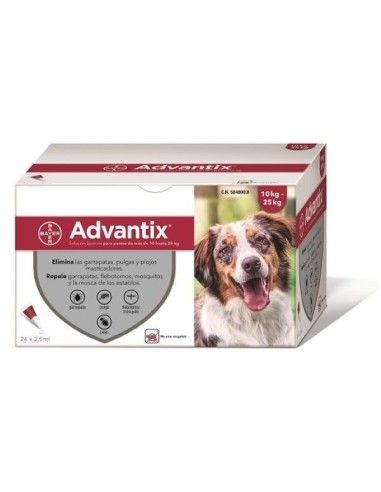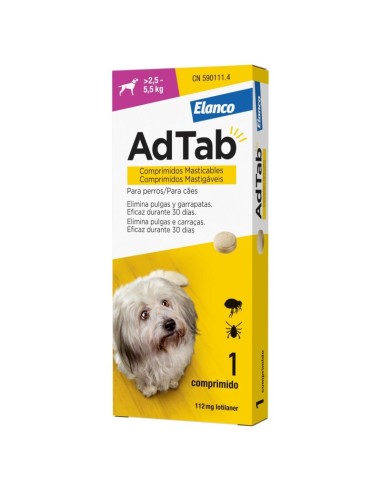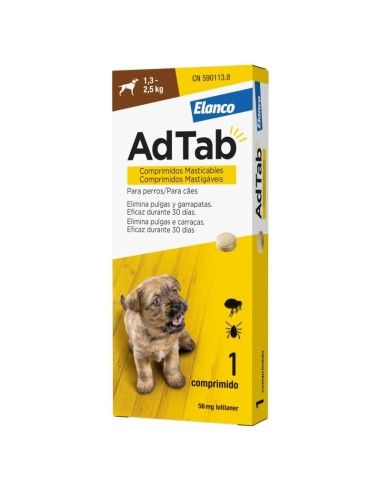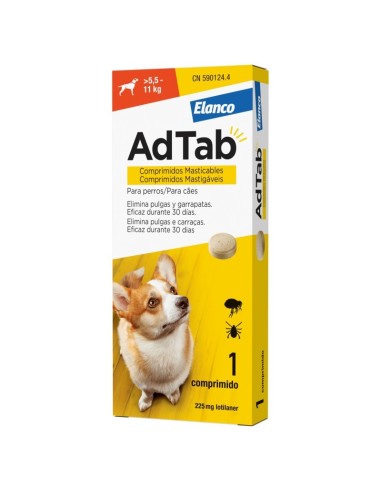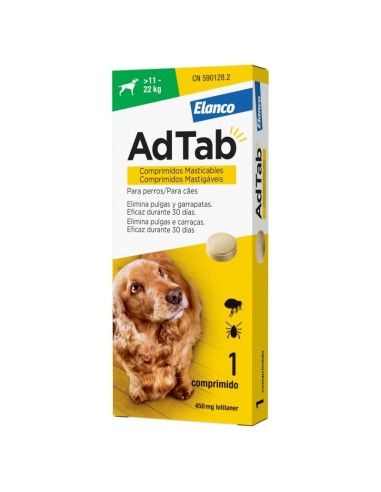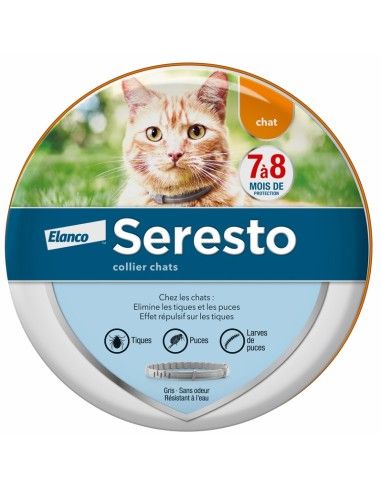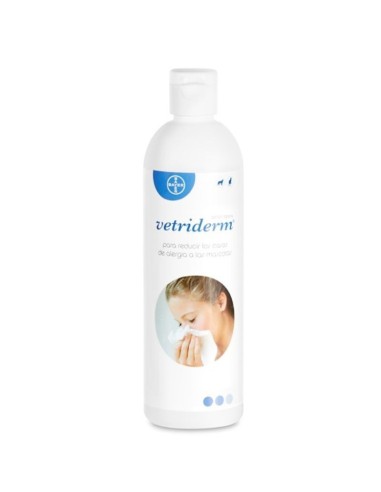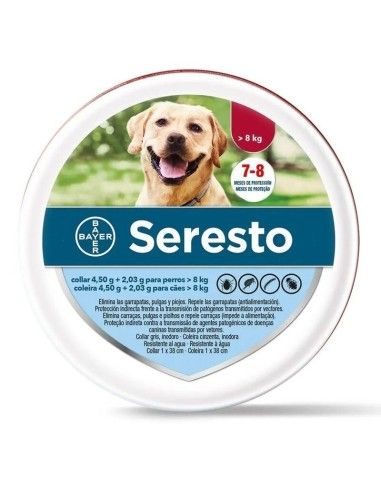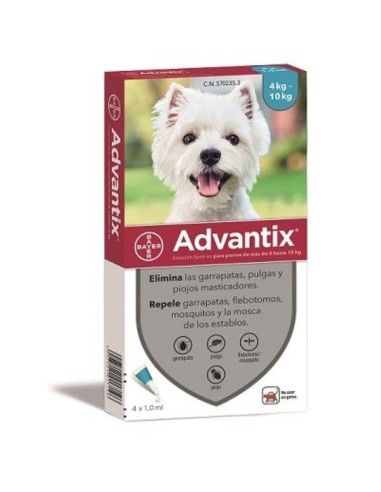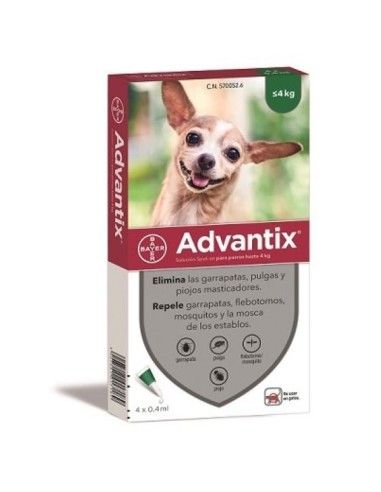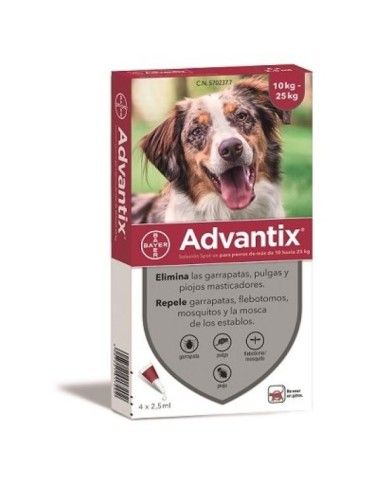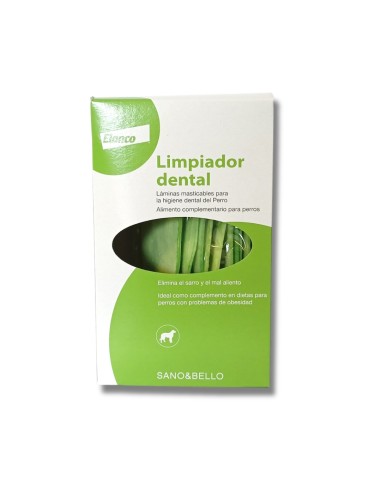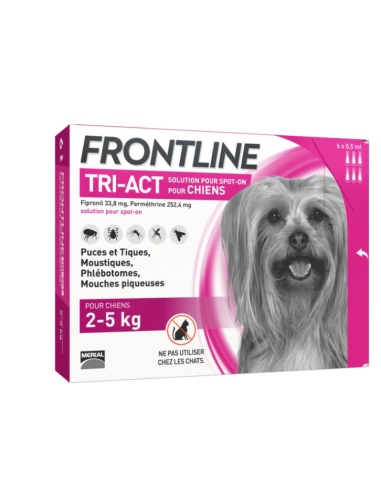
SERESTO COLLAR PERROS MENOS DE 8 KG, 38 CM
For the prevention and treatment of flea infestation for 7/8 months. Effective against tick infestations for 8 months due to its repellent effect and its acaricidal effect.
COMPOSITION BY COLLAR:
- Seresto for Cats and Seresto for Dogs =8 kg (collar 38 cm): 1.25 g of imidacloprid and 0.56 g of flumethrin.
- Seresto for Dogs >8 kg (collar 70 cm): 4.50 g of imidacloprid and 2.03 g of flumethrin.








PHARMACOLOGICAL PROPERTIES
Imidacloprid is an ectoparasiticide of the chloronicotinyl group, which acts effectively against fleas at all stages of development, including larvae, adult fleas and lice. Its effectiveness begins within 48 hours after the application of the Seresto collar.
In addition to the aforementioned indications, Imidacloprid has also been shown to be active against the flea Pulex irritans.
This compound has a high affinity for nicotinergic acetylcholine receptors in the central nervous system of fleas, which causes paralysis and death by inhibiting cholinergic transmission. However, in mammals, Imidacloprid has little effect on the nervous system due to its weak interaction with nicotinergic receptors and poor penetration across the blood-brain barrier. Therefore, its pharmacological activity in mammals is minimal.
Flumethrin, on the other hand, is an ectoparasiticide belonging to the group of synthetic pyrethroids. These compounds interfere with sodium channels in parasite neurons, resulting in delayed nerve fiber repolarization and eventually parasite death. In studies, it has been observed that some pyrethroids have a selective action on ectoparasites by interfering with specific receptors of a chiral conformation. No anticholinesterase activity has been detected in these compounds. Flumethrin provides the acaricidal activity of the Seresto collar, preventing the formation of fertile eggs in female ticks and also demonstrating sterilizing effects in in vitro studies.
In addition to the tick species mentioned in the indications, the activity of the Seresto collar against Ixodes hexagonus, I. scapularis and non-European tick species such as Dermacentor variabilis and I. holocyclus, a tick native to Australia that causes paralysis, has been verified.
This veterinary medicinal product has a repellent (antifeeding) effect against ticks, which prevents repelled parasites from ingesting blood and indirectly reduces the risk of contracting vector-borne canine diseases.
In addition to the pathogens mentioned in the indications, laboratory studies have shown that the Seresto collar provides indirect protection against the transmission of Babesia canis canis by the tick Dermacentor reticulatus, 28 days after the application of the treatment. It has also been shown in another laboratory study that, 2 months after treatment, it provides indirect protection against the transmission of Anaplasma phagocytophilum by the tick Ixodes ricinus. Consequently, the risk of transmission of diseases caused by these pathogens is reduced under the conditions of these studies.
Efficacy studies against sandflies (Phlebotomus perniciosus) have shown that the Seresto collar offers variable repellent (antifeeding) efficacy, ranging from 65% to 89% for 7-8 months after the initial application of the collar. In addition, a significant reduction in the risk of transmission of Leishmania infantum by sandflies has been observed in treated dogs compared to untreated dogs, based on data from 3 clinical studies conducted in endemic areas. The effectiveness in reducing the risk of canine leishmaniasis infection depends on the infection pressure of sandflies and has been between 88.3% and 100%.
The Seresto collar also improves Sarcoptes scabiei infestation in pre-infested dogs and achieves complete healing after 3 months.
In cats, according to a laboratory study conducted in a small number of cats, indirect protection against transmission of Cytauxzoon felis by the tick Amblyomma americanum has been demonstrated one month after treatment.
DIRECTIONS
The Seresto collar is indicated for the prevention and treatment of flea infestation (Ctenocephalides felis, C. canis) for 7-8 months, protecting the immediate environment of the animal by inhibiting the development of flea larvae for 8 months.
It may also be used as part of a treatment strategy for flea allergy dermatitis (DAPP).
The veterinary medicinal product is effective against tick infestations for 8 months due to its repellent (antifeeding) effect (Ixodes ricinus, Rhipicephalus sanguineus) and acaricidal effect (parasite death) (Ixodes ricinus, Rhipicephalus sanguineus, Dermacentor reticulatus). It is effective against larvae, nymphs and adult ticks.
It is important to note that ticks present on the dog before treatment may not die in the first 48 hours after the application of the collar, so it is recommended to remove them beforehand. Prevention of new tick infestations is initiated during the first two days after collar application.
The Seresto collar also offers indirect protection against the transmission of the pathogens Babesia canis vogeli and Ehrlichia canis by the tick Rhiphicephalus sanguineus, thus decreasing the risk of canine babesiosis and canine ehrlichiosis for 7 months.
In addition, it reduces the risk of infection by Leishmania infantum transmitted by sandflies for up to 8 months. It is also used in the treatment of biting/chewing lice infestation (Trichodectes canis).
CONTRAINDICATIONS
The Seresto collar should not be given to puppies less than 7 weeks old or kittens less than 10 weeks old.
It must not be used in animals with hypersensitivity to the active substances or to any excipient.
In the absence of available data, the use of the drug in pregnant or lactating and cats is not recommended.
ADVERSE REACTIONS
Rarely, in the first few days after placing the collar on animals that are not accustomed to wearing it, mild changes in behavior, such as scratching at the application site, may be observed. It is important to make sure that the collar is not too tight.
In cats, occasionally, and in dogs, rarely, mild reactions may occur at the application site, such as itching, redness and hair loss, which usually disappear in 1 or 2 weeks without the need to remove the collar.
In rare cases, it may be advisable to temporarily remove the collar until symptoms have disappeared.
In dogs, application site reactions such as dermatitis, inflammation, eczema or lesions have been reported rarely. In these cases, it is recommended to remove the collar.
Rarely, in dogs, neurological signs such as ataxia, tremors and seizures may appear. Given these symptoms, it is recommended to remove the collar.
In addition, in rare cases, both in dogs and cats, mild and transient reactions such as depression, changes in appetite, salivation, vomiting and diarrhea may initially occur.
ROUTE OF ADMINISTRATION
The Seresto collar is administered through the skin.
DOSAGE
For cats: 1 Seresto collar for cats should be used.
For dogs:
Dogs weighing less than or equal to 8 kg: 1 Seresto collar must be used for dogs weighing less than or equal to 8 kg.
Dogs weighing more than 8 kg: 1 Seresto collar must be used for dogs weighing more than 8 kg.
Tighten the collar loosely around the animal's neck, leaving a gap of about 2 fingers between the collar and neck. The animal must wear the collar continuously during the 8 months of protection. At the end of the treatment, the collar must be removed.
It is advisable to periodically check the fit of the collar and adjust it if necessary, especially in puppies and kittens that are in rapid growth.
The collar is designed with a secure closure mechanism. In the unlikely event that a cat is trapped by the collar, the force exerted by the animal is sufficient to widen and remove it quickly.
SPECIAL PRECAUTIONS
For animals:
The Seresto collar is water resistant and remains effective even if the animal gets wet. However, intense and prolonged exposure to water, as well as frequent use of shampoos, should be avoided, as this can decrease the duration of collar activity.
An overdose is unlikely to occur and no signs of overdose are expected. In the unlikely event that the animal ingests the collar, mild gastrointestinal symptoms may occur.
For the person administering the medicine:
Keep the bag containing the collar in the box until the time of use.
Do not allow children to play with the collar or put it in their mouths.
Animals wearing the collar should not sleep in bed with their owners, especially children.
People with known hypersensitivity to collar components should avoid contact with the collar.
After placing the collar, wash your hands with cold water.
I hope this version meets your requirements.

